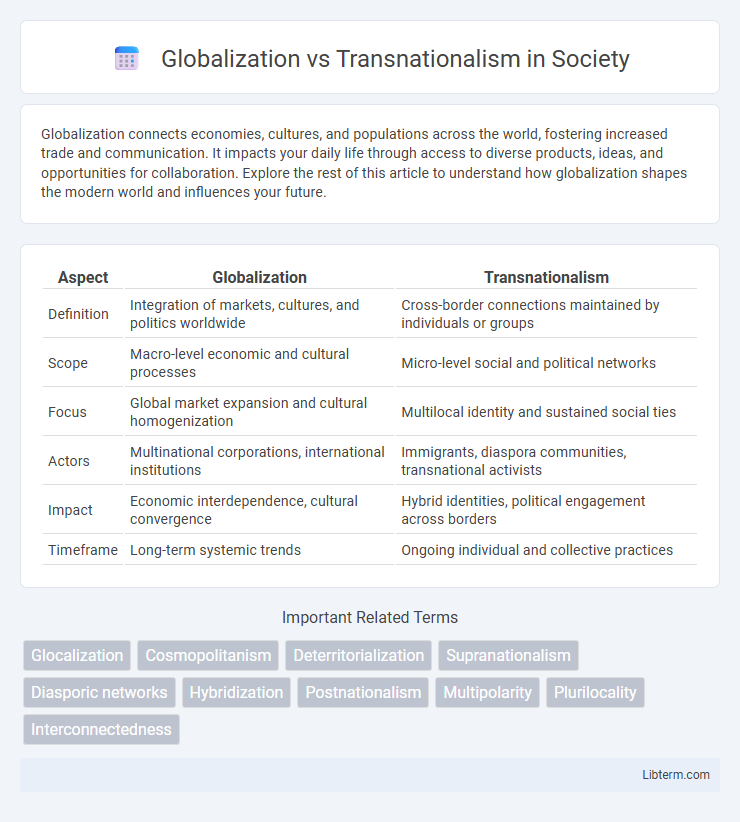Globalization connects economies, cultures, and populations across the world, fostering increased trade and communication. It impacts your daily life through access to diverse products, ideas, and opportunities for collaboration. Explore the rest of this article to understand how globalization shapes the modern world and influences your future.
Table of Comparison
| Aspect | Globalization | Transnationalism |
|---|---|---|
| Definition | Integration of markets, cultures, and politics worldwide | Cross-border connections maintained by individuals or groups |
| Scope | Macro-level economic and cultural processes | Micro-level social and political networks |
| Focus | Global market expansion and cultural homogenization | Multilocal identity and sustained social ties |
| Actors | Multinational corporations, international institutions | Immigrants, diaspora communities, transnational activists |
| Impact | Economic interdependence, cultural convergence | Hybrid identities, political engagement across borders |
| Timeframe | Long-term systemic trends | Ongoing individual and collective practices |
Defining Globalization and Transnationalism
Globalization refers to the increasing interconnectedness and interdependence of economies, cultures, and populations driven by cross-border trade, technology, and communication. Transnationalism, on the other hand, emphasizes the processes by which migrants create and sustain multiple social relations linking their societies of origin and settlement across national borders. While globalization highlights global economic and cultural integration, transnationalism focuses on the dynamic, multi-sited social networks that transcend nation-state boundaries.
Historical Backgrounds of Globalization and Transnationalism
Globalization traces back to the Age of Exploration in the 15th century, marked by European colonial expansion and the establishment of global trade networks like the Silk Road and the Atlantic triangular trade. Transnationalism, emerging prominently in the late 20th century, reflects the increased movement of people, ideas, and capital across national boundaries, propelled by advanced communication technologies and migration patterns. The historical context of globalization highlights economic integration and cultural exchanges on a planetary scale, while transnationalism emphasizes the fluidity of identities and social processes that transcend nation-state borders.
Key Differences Between Globalization and Transnationalism
Globalization refers to the broad process of increased interconnectedness and integration of economies, cultures, and political systems worldwide, driven by trade, technology, and communication advancements. Transnationalism emphasizes the sustained social, economic, and political activities that connect individuals and groups across national borders, focusing on cross-border networks and identities. The key difference lies in globalization's macro-level economic and cultural flows versus transnationalism's micro-level, ongoing social practices and relationships that transcend nation-states.
Economic Impacts: Globalization vs Transnationalism
Globalization drives economic integration through worldwide trade expansion, capital flow, and market convergence, enhancing global GDP and reducing costs via economies of scale. Transnationalism emphasizes cross-border economic networks established by diaspora communities and multinational enterprises, fostering localized economic development and innovation hubs. Both influence labor markets and regulatory policies, but globalization primarily shapes macroeconomic trends while transnationalism impacts microeconomic and community-level economic dynamics.
Cultural Exchange and Identity Transformation
Globalization drives extensive cultural exchange by increasing interconnectedness among nations, leading to the diffusion of customs, languages, and technologies worldwide. Transnationalism, however, emphasizes the active role of migrant communities in sustaining and reshaping cultural identities across borders, fostering hybrid identities that blend elements from multiple nations. This dynamic process challenges traditional notions of identity, promoting fluidity and multiplicity in cultural affiliation rather than homogenization.
Political Dynamics in a Globalized vs Transnational World
Globalization reshapes political dynamics by promoting centralized governance structures and international institutions that regulate economic and security policies across nations. Transnationalism, in contrast, emphasizes diverse networks of political actors operating beyond nation-state boundaries, fostering multi-layered governance that challenges traditional sovereign power. This shift influences global policymaking, as non-state actors and cross-border alliances gain significance in addressing complex global issues.
Technology’s Role in Globalization and Transnationalism
Technology accelerates globalization by enabling instant communication, cross-border e-commerce, and real-time data exchange, reshaping economic and cultural connections worldwide. Transnationalism leverages digital platforms to facilitate sustained social, political, and economic ties across national boundaries, empowering diasporic communities and multinational organizations. Innovations such as cloud computing, 5G networks, and blockchain enhance both global integration and transnational networks by supporting decentralized collaboration and secure global transactions.
Social Networks and Diasporas: Transnational Connections
Transnationalism emphasizes the active social networks and diasporas that sustain cross-border connections, fostering continuous cultural exchange and economic collaboration among communities worldwide. Unlike globalization's broad economic and political processes, transnational social networks enable individuals to maintain multiple attachments across countries, creating dynamic flows of information, resources, and identity. Diasporas play a crucial role in reinforcing these transnational ties, influencing host and home societies through remittances, cultural practices, and political activism.
Challenges and Criticisms of Globalization and Transnationalism
Globalization faces challenges such as economic inequality, cultural homogenization, and environmental degradation, which critics argue undermine local identities and deepen global power imbalances. Transnationalism is criticized for its complex legal and political implications, often complicating national sovereignty and generating conflicts over regulatory standards across borders. Both phenomena face resistance from nationalist movements and raise concerns about labor exploitation and the erosion of social welfare systems.
Future Trends: The Evolving Relationship Between Globalization and Transnationalism
Future trends indicate an increasing convergence of globalization and transnationalism, driven by advancing digital connectivity and cross-border cultural exchanges. Transnational networks will amplify the role of non-state actors, shaping economic and political landscapes beyond traditional national boundaries. Emerging technologies and shifting geopolitical dynamics will further intertwine global markets and transnational communities, fostering more complex interdependencies.
Globalization Infographic

 libterm.com
libterm.com